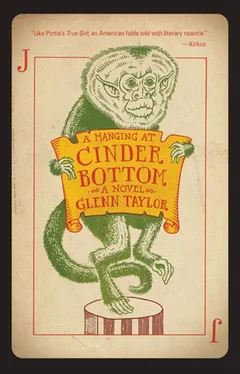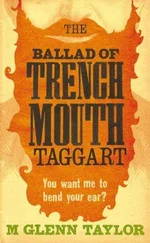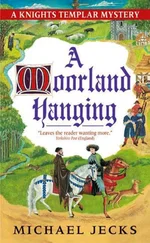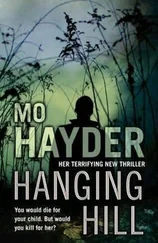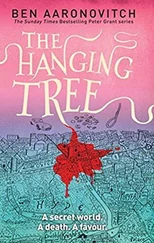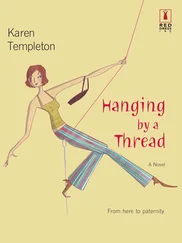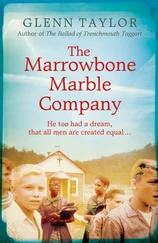Abe looked at the space between the cars.
The brakeman was now at a jog, fifty yards off. “Hey!” he yelled.
“You go to Baltimore — the wharf, at Frederick Street. You ask there for Mr. Ben Moon. You tell him you are my son.”
Abe thought of all he’d left undone. He wanted to make a dash for the twelve hundred dollars stashed in his wardrobe. He wanted to tell his father that he couldn’t go, that he needed to get to Goldie, that there was something she had to know. It was not his time to leave, he wanted to say, but the ball-knot had returned and risen now to his throat, and he couldn’t utter a word.
Al pulled his son up then by the shirtfront. “Ben Moon,” he said, and he shoved him toward the mainline.
Abe ran, tucking the board in his armpit. He timed his jump and reached for the hopper’s ladder. The train was gaining considerable speed. He pulled himself up.
Al could see him as he got smaller in the distance, slipping between the cars and kneeling to set the board across the knuckles. He hoped his middle boy would get a solid foothold.
“Hey!” the brakeman yelled again. He was twenty paces off with his gun drawn.
“Robert,” Al Baach called to him. “It’s me. It’s Al.” He reached for his billfold. The black mud from the creek bank had gotten inside his pockets.
Robert the brakeman slowed up. “Al Baach?” he said, raising his lantern. “What in the hell are you doin out here?”
But Al did not answer. He stood in the downpour and thought of what would come for him now, of what would befall his family. He thought of the Bottom and how Trent had begun to let it be, how he’d allowed the Baach boys to run Wyoming Street and Dunbar too. He thought of the previous spring’s Alhambra banquet, where Trent had pointed his steak knife at Al across a crowded table of T-bones and said to the important men, “Gentlemen, right there is your next councilman.”
All of that was over now.
He watched the eastbound train push out of the yard and into the bend at town’s edge. Its whistle cut the rain and bounced off the ridge. It was the most familiar sound Al knew, but on that night, it hollowed out his very soul.
High above him, on the bald steps of the mountain, Goldie Toothman walked an old skid trail, the loggers’ dead slash still tangled in the ruts, piled high as her waist. She carried a big box of kitchen matches in the pocket of her coat. Taffy Reed had sold the matches to her for a nickel, claimed to have soaked them in a solution that rendered their phosphorous heads immune to water’s dousing. Goldie had a notion, as she watched the eastbound train curl around a slick-faced highwall, to set the whole tangle afire. She’d left Hood House with no real thought of a plan, only a feeling in her gut that Abe was sure to die.
Now she stopped and stood still and watched the tiny men in the railyard below. They were lit by the glow of the brakemen’s lantern between them. They exchanged money for silence.
Goldie did not watch the train as its tail was swallowed by the woodland hollows ahead. She knew then that Abe rode somewhere inside its rumble, and she wondered if her terrible dream’s fruition might come to be on some other ground, if Abe would dangle for his debts on a foreign limb where she could not see him. It would be easier that way.
She looked up and let the rain fall into her eyes.
THE CROWS WERE IN THE EVERGREENS
April 20, 1910. New York
It was not yet four AM when the cardsharp exited the ill-lit Bowery bar. He took long strides to a place he knew inside the wall of a graveyard on Second Street. There he leaned and opened the quartered newspaper in his grip. It was the evening edition. He’d lifted it from the bar’s counter before he slid unseen out the door, and when he’d folded it around his earnings, the headline below the crease had declared: Summer Here Two Months Early .
The air was June hot.
Now he set the paper on a wall ledge and leaned and counted his latterly money. No light reached the long lawn of vaults, so he sequenced the notes on touch. One hundred and twenty three dollars. He right-angled dog-ears with his thumb, flatted the stack, and split it in two. He took off his shoes and inside each he made for his money a bed. A man who walked could appreciate the extra cushion.
He lit a cigar and held the spent match until he’d left the graveyard. He walked to First Avenue, stood beneath a gas lamp, and looked about. There was not a soul, and this struck him as peculiar.
He took from his jacket pocket a handbill made by a printmaker he knew. It was folded at the middle, a good stout paper, its dimensions about that of a book. Its artwork depicted a spade which swallowed a club which swallowed a heart which swallowed a diamond. At the center of the diamond there was an eye, with a man inside the pupil. Across the bottom, the handbill read Watch the Master Card Manipulator! The Incomparable Playing Card Prophet known around the world as Professor Goodblood will astound and delight! He sat down on his heels and tented the handbill at its crease. He set it as a house upon the street brick. He produced again his matches and struck one and held it underneath until the handbill burnt to a fine black scatter. There was no need for it now.
He’d only gotten the short-run show because the owner of the Stuyvesant Theatre owed him considerable money. It was a gesture of goodwill. Abe had considered the offer and had gone so far as to print a sample handbill, but in the end, the man sold his theater and moved to Australia, and the new owner had told him, “Listen Goodblood, card tricks are flapdoodle. The people want leg-drop action. They want raincoats and whiskers.”
It was of no real import. Professor Goodblood was not real.
Abe Baach was the cardsharp’s name, but no one knew it. He was called by many names in those times, names dependent upon location and disguise of mustache or beard or eyeglass. Names dependent upon the mark he roped or the tale he told.
He wore a scar from his ear to his bottom lip.
He had more money than he could spend, and it had not come from paltry vaudeville checks or short-run opening card acts. The freshest of it had come easy on this particular night. His mark at the Bowery bar was a fat crooked rich man who had drunk his weight in gin. Abe had nearly let him walk from the table with dime enough for streetcar fare and a cup of coffee. But the man proved unworthy, ruining a competitive hand of stud poker with too much chatter on such unoriginal topics as the cultural inferiority of immigrants. “The micks and the guineas,” he’d said, “are bull-headed ingrates, and the kike panders to the nigger.” Abe had nodded and laughed and said how right the man was before he took his last nickel.
Now he walked alone up First Avenue to the apartment where he’d slept most nights for a month. The tenant was a good-looking gal from Kingston, Jamaica, a stage actress and dancer who sometimes passed for white and who pronounced her words in a way that tickled him. On the first night he’d slept over, after enjoying a maneuver Abe had privately named the low-high side-to-side , she had said to him the following: “You got good curve in de hose.”
He crossed Seventh Street and sidestepped a dried-out pyramid of horse manure.
Up ahead, in the darkened doorway of a flophouse, a man stood. Abe had seen him from the corner and had put a hand to his vest change pocket, where he kept a half dollar and a little two-shot spur-trigger pistol. It was his custom with strangers on dark streets to allow three possible greetings. A passing nod if the gentleman was average. Be he mendicant, the gift of a coin. And should the man be looking to rob a body, he’d meet the empty smile of a muzzle.
Читать дальше
Конец ознакомительного отрывка
Купить книгу
